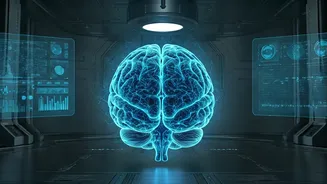Brain-Boosting Basics
The concept of reversing brain aging through mental exercises is gaining traction. Studies now suggest that, similar to how physical exercise strengthens
the body, mental workouts can also improve cognitive performance and potentially counteract age-related decline. The core idea is that the brain, like any other muscle, benefits from regular training. This training involves engaging in activities that challenge cognitive functions, such as memory, attention, and problem-solving. This approach not only aims to maintain but also to enhance brain health. By regularly incorporating mental exercises into daily routines, individuals can hope to sharpen their cognitive abilities and promote long-term brain health. The selection of the right exercises is crucial. Choosing activities that are both engaging and challenging is essential. These exercises should stimulate various parts of the brain to ensure comprehensive cognitive development. Consistency and regular practice are key factors for maximizing the benefits of these mental workouts. Think of it as a commitment to ongoing brain health.
Memory Game On!
One of the most effective exercises for improving brain health is memory training. This involves a variety of activities designed to enhance recall and information retention. Simple tasks such as memorizing lists, recalling details from stories, or learning new words can be incredibly beneficial. Memory games, such as matching pairs, are a fun way to exercise the brain. For instance, you could start with recalling a short grocery list and gradually increase the length and complexity of the items. Another great way is to try the method of loci, also known as the memory palace technique. This involves associating items with specific locations to enhance recall. Additionally, engaging in activities such as crossword puzzles, Sudoku, and other word or number games also supports memory functions. Regular practice of these exercises strengthens neural pathways. This helps the brain to store and retrieve information more efficiently. These activities not only challenge the brain but also provide a sense of accomplishment. It further promotes a healthy and active mind. Incorporating these memory-enhancing exercises into your daily routine is a simple yet effective way to maintain cognitive sharpness.
Mindful Meditation Matters
Mindfulness practices, such as meditation, have been proven to have significant benefits for brain health. Meditation helps to reduce stress and improve focus, both of which are crucial for maintaining cognitive function. Regular meditation can enhance attention span and improve the ability to concentrate. This is because mindfulness practices train the brain to stay in the present moment. This helps to reduce the distractions from racing thoughts. There are many types of meditation that can be incorporated into your daily life. Simple breathing exercises, focused on the sensation of inhaling and exhaling, are a great starting point. Another method is body scan meditation, where attention is directed to different parts of the body. This promotes awareness and relaxation. The practice of mindfulness also increases grey matter in the brain, which is associated with better emotional regulation and overall cognitive performance. By consistently practicing meditation, individuals can develop a stronger ability to manage stress. Moreover, they can improve their ability to focus and maintain a healthy mental state, all of which contribute to better brain health. Incorporating even just a few minutes of meditation daily can yield positive outcomes.
Puzzle Power Unleashed
Engaging in puzzles, such as crosswords and Sudoku, is an excellent way to stimulate cognitive functions and keep the brain sharp. These activities challenge the brain's problem-solving skills, memory, and logical reasoning. Crosswords require recall of words and definitions. Sudoku demands strategic thinking and pattern recognition. Puzzles like these are not only fun but also help to create new neural connections. Regularly solving puzzles can improve cognitive flexibility, allowing the brain to adapt more easily to new information and challenges. Beyond traditional crosswords and Sudoku, other puzzle types, such as jigsaw puzzles, also provide a valuable workout for the brain. Jigsaw puzzles improve spatial reasoning and visual-motor coordination, while strategy games like chess are known for enhancing critical thinking. The constant stimulation of the brain through these puzzles helps in maintaining cognitive agility. This is an excellent way to keep the mind sharp and improve mental function. Incorporating puzzles into your routine can provide a pleasurable and effective approach to maintaining a healthy brain.
Learn New Skills
Learning a new skill is one of the most effective strategies for maintaining and enhancing brain health. The process of acquiring new knowledge or abilities strengthens neural pathways and boosts cognitive flexibility. This can range from learning a new language to mastering a musical instrument. Even something as simple as taking up a new hobby can have significant cognitive benefits. Learning a new language involves memorizing vocabulary and grammatical rules. Playing a musical instrument requires coordination, pattern recognition, and memory. New hobbies, such as painting or cooking, engage different parts of the brain. They also stimulate creativity and problem-solving skills. The act of learning something new challenges the brain to adapt and form new connections, increasing cognitive reserve. This in turn makes the brain more resilient to age-related decline. The benefits of learning new skills extend beyond cognitive enhancements. It boosts self-esteem and provides a sense of accomplishment, promoting overall mental wellness. Regardless of the new skill chosen, the act of learning will have a positive impact on brain health. Therefore, make a conscious effort to learn something new regularly.












![[WATCH] 'Real Madrid, Ramadan and rest' - Mohammed Siraj how last-minute World Cup call-up changed February plan](https://g-mob.glance-cdn.com/public/fc/image/ByYT_LEmlrD0.webp)








